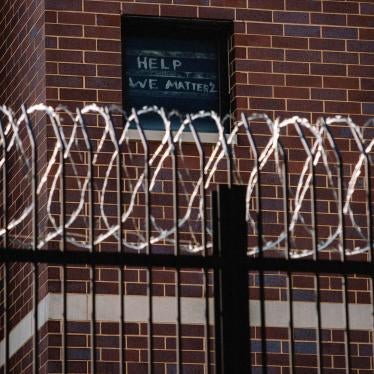The Honorable Mitch McConnell
United States Senate
Washington, DC 20510
The Honorable Charles Schumer
United States Senate
Washington, DC 20510
The Honorable Lindsey Graham
U.S. Senate Judiciary Committee
Washington, DC 20510
The Honorable Diane Feinstein
U.S. Senate Judiciary Committee
Washington, DC 20510
July 30, 2020
RE: Support the Emergency Community Supervision Act’s inclusion in the Senate COVID-19 response package
Dear Majority Leader McConnell, Minority Leader Schumer, Chairman Graham and Ranking Member Feinstein:
Warnings from the Centers for Disease Control and Prevention and correctional health experts detail the heightened risk that incarcerated people face from COVID-19 due to overcrowded and unsanitary conditions of confinement. People incarcerated in the Federal Bureau of Prisons (BOP) are no exception. To limit the spread of COVID-19 in federal prisons and protect the lives of the most vulnerable in these facilities, the undersigned organizations urge you to support the Emergency Community Supervision Act and include its provisions in the Senate’s COVID-19 response package being considered now.
Since the onset of the pandemic, over 10,000 people in BOP custody have tested positive for COVID-19. As of July 29, 103 people have died from the virus.[1] Despite the high number of cases and the strong likelihood of increased infections within the BOP, public health guidelines for physical distancing and sanitation are not being adequately followed. In March, experts in public health and correctional medicine called for “immediate steps to limit the risk posed by mass confinement, including releasing those detained on bail, along with elderly prisoners who pose little danger to the public.”[2]
The Emergency Community Supervision Act, first introduced by Senator Cory Booker in response to the pandemic and incorporated in the Health and Economic Recovery Omnibus Emergency Solutions (HEROES) Act, H.R. 6800, would aid the BOP in meeting these necessary public health recommendations to limit overcrowding. The legislation would transition people vulnerable to serious illness from COVID- 19 and those nearing the end of their sentence from incarceration to community supervision (e.g., home confinement) unless they present an immediate threat of danger. Use of pretrial detention and supervised release would be modified under the bill in order to protect vulnerable people, including youth, and contain the spread of the virus both in detention facilities and surrounding communities.
Congress granted the Department of Justice new authority in the CARES Act to help reduce the federal prison population by expediting transfers to home confinement. The Attorney General severely limited the effect of this new authority, however, by creating a long list of eligibility criteria, including that individuals must have a PATTERN risk score of minimum, have completed at least 50 percent of their sentence, and reside in a low- or minimum-security facility. As a result, a very narrow class of people has qualified for transfers, and even then, so few are benefiting that there has been no meaningful impact on incarceration levels across the system. Moreover, elderly people and those with existing health conditions are not prioritized for transfers, despite their serious vulnerability to COVID-19.
The Department of Justice and the Bureau of Prisons have not done enough to protect the lives of people incarcerated in federal facilities. The Senate’s quick passage of the Emergency Community Supervision Act can better help to stop the spread of the coronavirus in federal facilities by mandating transfers of elderly and vulnerable people in BOP custody who do not present a credible threat to public safety during this health crisis. The consequence of failing to take swift action will surely result in more illness and death.
Thank you for your consideration of this urgent request. Please contact Kara Gotsch, kgotsch@sentencingproject.org, or Nkechi Taifa, nkechi@thetaifagroup.com, with questions.
Sincerely,
Aleph Institute
American Civil Liberties Union
Amnesty International USA
Braxton Institute
CAN-DO Foundation
Center for Law and Social Policy (CLASP)
Church of Scientology National Affairs Office
CURE (Citizens United for Rehabilitation of Errants)
Defending Rights & Dissent
Drug Policy Alliance
Federal Public & Community Defenders
FREE! Families Rally for Emancipation and Empowerment
Friends of Guest House
Health in Justice Action Lab, Northeastern University School of Law
Human Rights Watch
Jewish Council for Public Affairs
Justice for Women COVID-19 Task Force
Justice Roundtable
The Leadership Conference on Civil and Human Rights
Legal Action Center
Life for Pot
A Little Piece of Light
Mommieactivist and Sons
NAACP
National Association of Criminal Defense Lawyers
National Association of Social Workers
National Council of Churches
National Council on Alcoholism and Drug Dependence-Maryland Chapter
National HIRE Network
National Immigrant Justice Center
National Religious Campaign Against Torture
NETWORK Lobby for Catholic Social Justice Prison Families Anonymous
The Project on Government Oversight
The Sentencing Project
StoptheDrugWar.org
Tzedek Association
Union for Reform Judaism Women Who Never Give Up, Inc.
[1] https://www.bop.gov/coronavirus/
[2] https://www.washingtonpost.com/opinions/2020/03/17/we-must-release-prisoners-lessen-spread- coronavirus/








